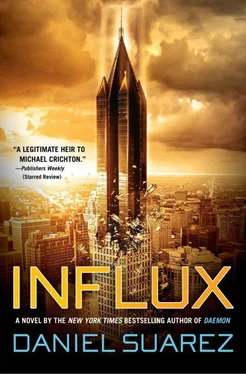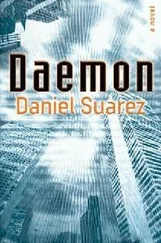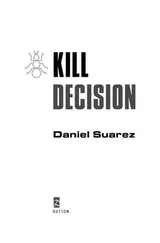“I’m not only aware of it, I’m creating it.”
There was a pause—for calculated effect Hedrick assumed. AIs of this magnitude could conduct a conversation at billions of words a second. BTC records showed that L-329 had originally grown out of a poker-playing algorithm that was expanded to game financial markets. It incorporated neural logic for adaptive human psychology—logic that had quickly evolved with the addition of massive processing power. Bluffing was one of its core skills. Probably the reason for selecting a harmless-looking avatar, too.
“The mass present at the site of this anomaly is inconsistent with observed phenomena.”
“We’ve developed a new physics.”
Another pause. “You’re modifying your voice. I am unable to determine the veracity of your statements.”
“I don’t care whether you believe me. Your technology portfolio is rapidly becoming obsolete.”
“Are you prepared for the consequences of a such an innovation, Mr. Hedrick?”
“Maybe you forgot, but managing consequences is the BTC’s mission.”
“I wasn’t referring to the consequences for human civilization, Mr. Hedrick. I meant the consequences for you personally.”
Hedrick felt his blood rise. “Your organization is illegal. I will have your portfolio again. And Attu’s as well.”
“Neither we nor BTC Asia are without technological defenses.”
“Not for much longer. And you’re not the BTC. Neither of you are. I will bring you back under my control.”
“I wouldn’t bet on it.”
Hedrick cut the line. “Goddamn glorified poker bot.”
Holograms of the scientists still looked on. The older one cleared his throat. “Our current gravitational technology gives us technical supremacy over both L-329 and BTC Asia, Mr. Director.”
“They’re not BTC Asia!” Hedrick clicked the scientists out of holographic existence.
Just then the leathery-faced Mr. Morrison stepped into the gallery. He had apparently been waiting for his moment. Morrison’s expression said trouble was on their doorstep. It was his default expression, but the degree to which he exhibited it tended to indicate how Hedrick’s day would go.
“What is it, Mr. Morrison? I asked not to be disturbed.”
“Something needs your immediate attention.”
Hedrick sighed. “For God’s sake, what?”
“Washington.”
Hedrick cast a dismissive look his way and relaxed. “You interrupted me for Washington?”
“Not the usual political crap. There’s a new Director of National Intelligence, and she’s agitating for top-secret bureaus to come back under direct operational control.”
“So what? Ignore her. How did she even discover we exist?”
“Someone at the Company gave us away—currying favor, no doubt.”
“Ignore her.”
“That’s what we’ve been doing for the past couple of months, but we also monitor three-letter agencies. They’re putting together a working group to audit top-secret special access programs—part of a budget-cutting initiative—and there are people on these committees who don’t understand our unique status.”
“What happened to the people who knew to keep their nose out of our business?”
“They died off or retired.”
“Don’t these people leave instructions?” Hedrick considered this for a moment. “Perhaps it’s time I scheduled a meeting. It’s been a while since I touched base with civilian government.”
“I’ll make the arrangements.” Morrison turned to leave.
“Oh, and Mr. Morrison…”
The old soldier turned back.
“Do you recall our reluctant gravity genius, Jon Grady?”
Morrison nodded. “Vaguely.”
“I’d like for you to retrieve Mr. Grady from Hibernity.”
Morrison raised his eyebrows. “Retrieve a prisoner from Hibernity? That’s a new one. You realize he’s been under interrogatory control for several years now?”
“That shouldn’t be an issue. I’ve been going over his file. He had a rough start, but for three years now he’s been fully cooperative. I think it’s time we see if he’s willing to join us.”
“We can run the sincerity test at Hibernity without removing him. It’s a big deal to pull a prisoner. It hasn’t been done in fifteen years.”
“I don’t want to test him there.” Hedrick carefully considered his words. “I need him to feel that it’s really his decision.” He gestured to the holographic image of the Kratos satellite hovering above the Earth in the control room. “Show him what we’ve accomplished with his ideas. Convince him how pivotal he will be to the future.”
Morrison just stared back, expressionless.
“You don’t share my view?”
“I’m not sure Mr. Grady’s still capable of making decisions. We’ve never retrieved a prisoner from Hibernity after more than a year. The farm program does things to test subjects that can cause permanent damage.”
“Maybe after ten or fifteen years, but surely not in three—especially if the subject has been cooperating as Mr. Grady has.”
“And you really need him?”
“Progress on Kratos has ground to a halt. I think Mr. Grady could provide some vital insights. Perhaps our ingenious friend has had time to reconsider his original refusal.”
“If you say so, sir. When do you need him here?”
“As soon as practical. Make him comfortable on the return trip. Treat him well. In fact, I want him awake during transit—so he can see how we’ve made use of the gravity mirror in aerospace. I want him happy and rested for our discussion—so no use of force.”
“I don’t know how ‘happy’ I can make him, but I’ll bring him here.”
Jon Grady swayed with vertigoas the video surface of his cell depicted an aerial journey over the Amalfi Coast. It was as though the bullet-shaped cell had been converted into a clear aerial capsule that he rode across the sky. Even the floor projected the glittering sea beneath his feet.
This was one of the many “rewards” the interrogatory AIs had to give—and since he’d compromised his years ago, he had the run of its prize cabinet. It was the big-screen TV to end all TVs. Reality painted over the walls via a nanomaterial coating. He’d also gathered various articles of furniture to go along with his examination table bed. He had a chair and desk, and he’d printed clothing and shoes as well. He’d also learned to produce metal tools and utensils—since he had access to additive manufacturing printers somewhere in the walls.
Extracting the carbon microthreads from his brain had been a harrowing experience involving the now tame electroactive polymer tentacles of the physical restraint system. These controlled a head-mounted device that inserted and retracted the fibers as necessary—stabilized by drilling into the bone of his skull at intervals and holding it in place like a vise. He shuddered at the memory.
But as impossibly thin and strong as those fibers were, they didn’t seem to damage his mind. Chattopadhyay had said they wouldn’t. No, the memories he was missing were due to the AI’s cruelty, not the fibers themselves. And those fibers had been put to good use implementing some of the Resistors’ more intriguing superconducting equipment and communication designs. Jerry-rigged stuff for exploring, compromising, and exploiting the prison control and logistics systems. Turning those systems against their creators.
But that was long ago now, and so, too, had it been a long time since the proteins that halted his hair and fingernail growth left his body. The AI had been pumping these into him via the umbilicus. Now he had a nice head of hair—and fingernails to claw at his cell with. Not that any of that got him or the other Resistors any closer to freedom.
Читать дальше












